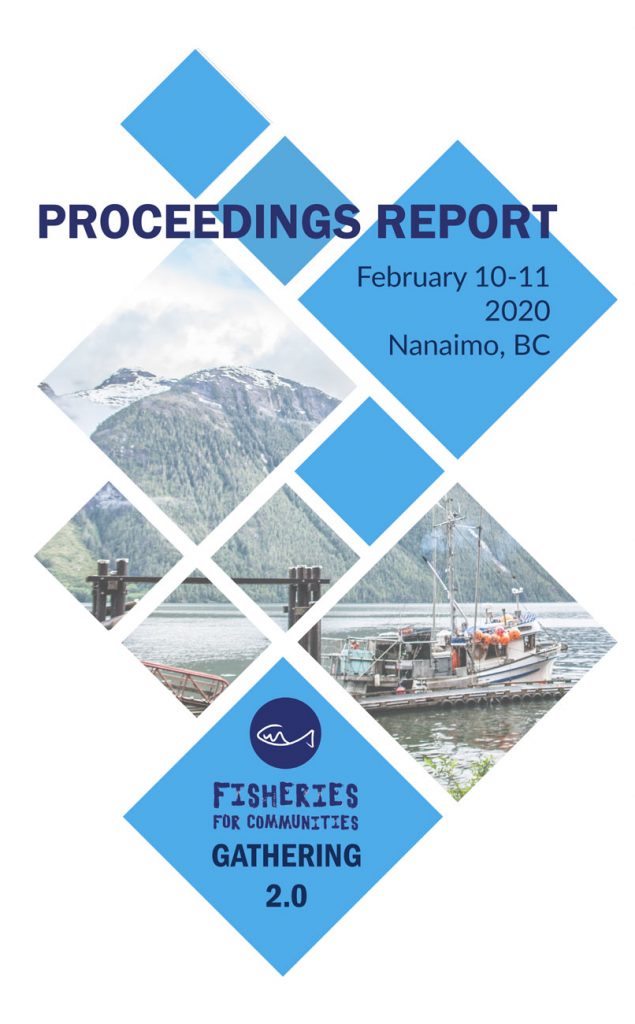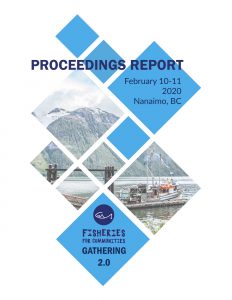EXECUTIVE SUMMARY
The Challenge
Thriving, sustainable fishing communities are critical to the health and well-being of Canada, but they face complex and growing threats. This is especially true in BC, where policies have allowed corporate interests and investors to gain increasing control of fishing access rights on our coast. As a result, there has been an erosion of the many social, cultural, and economic benefits derived by working fish harvesters and coastal communities. Current BC fisheries policies are also undermining the ability of fish harvesters and fishing communities to engage meaningfully in the management and stewardship of adjacent marine resources. This is diminishing the health and well-being of our coast and of Canada as a nation.
The Opportunity
Despite the challenges facing BC’s fisheries, we have an opportunity to make positive change. In the two years since the first Fisheries for Communities Gathering (February 2018) a number of significant political changes have occurred.
- In June 2019, the Federal Government enacted major changes to Canada’s Fisheries Act (Bill C-68) that, among other things, empowered the Fisheries Minister to take socio-economic benefits for fish harvesters, coastal communities, and Indigenous peoples into consideration in fisheries management decision making.
- In February 2019, the Province of BC appointed a Wild Salmon Advisory Council (WSAC) and the Council’s report, “Recommendations for a Made-in-B.C. Wild Salmon Strategy”, called on the provincial government to actively support policy reform for BC fisheries.
- The House of Commons Standing Committee on Fisheries and Oceans (FOPO) conducted an in-depth review of West Coast fisheries, and their report, “West Coast Fisheries: Sharing Risks and Benefits,” published May 2019, made 20 recommendations on action steps to improve BC fisheries policies and regulations and their social and economic outcomes.
These new developments are evidence of a growing understanding at various levels of government that fisheries policies and the industry structure in BC are failing fish harvesters, and coastal communities. There is a greater awareness today of the need to revive and sustain the social, economic, and cultural benefits derived from commercial fisheries.
The Fisheries for Communities Gathering 2.0
The two-day Fisheries for Communities Gathering 2.0 brought together over 120 individuals from diverse backgrounds, including Indigenous and non-Indigenous fish harvesters, academics, NGOs, industry associations, First Nations leaders, provincial and federal government officials, and policy experts to discuss the issues, share experiences, and explore change needed to revitalize our coast, now and in the future.
The Gathering included expert panels and round-table discussions allowing participants to review new research findings and express concerns and desired outcomes. Attendees agreed that government action and follow-through on fisheries issues are desperately needed. The major panelist themes from the Gathering were:
Navigating rough waters: on-the-ground experience with fisheries management challenges and opportunities. Panelists explored major challenges and possible paths forward, including collaborative marine planning, rebuilding First Nations fisheries access, and how the fishing industry can use social media as a tool for change.
Understanding and measuring the impacts. Panelists shared evidence and insights derived from their research on the BC fisheries access regime and its social and economic impacts on harvesters and communities.
Learning from other regions, finding a common ground, and ways forward. Panelists from Atlantic Canada, Alaska, and New England described the challenges they face in their regions and identified models successful in realizing better fisheries outcomes.
Tools for change – insights on the FOPO and WSAC reports. Panelists reviewed the findings and recommendations of FOPO’s “West Coast Fisheries: Sharing Risks and Benefits” report, and BC WSAC’s, “Recommendations for a Made-in-B.C. Wild Salmon Strategy.”
In addition, roundtables, guest speakers, and Q&A sessions allowed attendees to respond to panelists, learn from one another, and build shared perspectives on issues. These discussions led to improved understanding of commonly held values and the challenges inherent in BC fisheries. Despite the diversity of backgrounds in the room, the attendees collectively felt:
A frustration with how the current system is failing them,
“We are tired of talk, we need action.”
A pressing need for reform,
“We have a small window for change.”
A commitment to setting aside differences to achieve positive change collectively sought,
“We need to work together and build unity and a common voice.”
The Gathering culminated in a powerful moment of unity around a consensus statement.
Fisheries for Communities 2.0 Consensus
Despite decades of divisive policies that have fractured the industry and the region and undermined the viability of independent fishing enterprises and coastal communities, participants with diverse interests came to a consensus at the Gathering on the need to move forward with real and immediate action.
There was consensus in the room that the Federal Government needs to formally respond to and act on the recommendations of the May 2019 FOPO Report: “West Coast Fisheries: Sharing Risks and Benefits”.
Further, the Province of BC must become a real partner with the Federal Government to achieve needed changed in BC fisheries, starting with establishing a Provincial Ministry for Fisheries.
The Gathering participants agreed that all 20 FOPO recommendations are relevant and need to be considered, but certain recommendations are especially critical and should receive special priority.
Recommendations 2, 4, 8, & 19 were identified as urgent and should be acted on immediately to move toward better fisheries outcomes.
#2: Stopping future sales of quotas and licences to non-Canadians.
#8: Financially incentivize independent fish harvester ownership of licences and quotas.
#19: Regulation of leasing costs during transition.
#4: Transparency of beneficial ownership of quotas and licences.
Through a voting process, participants prioritized these four FOPO recommendations as a starting point for recapturing a fairer share of the wealth of our marine environment to benefit coastal communities, First Nations, and working harvesters.
Participants identified FOPO recommendations 14 & 15 as critically important for ensuring an effective and principled process for achieving major reform of fisheries licensing policies.
#14: New policy framework developed through authentic and transparent engagement with active harvesters from each fishery/fleet, First Nations, non-fishing licence/quota holders and processors.
#15: Minister of Fisheries and Oceans Canada establish an independent commission, to look at options including a fair-share system and licensing transition options.
Participants agreed that FOPO recommendations 18 & 20 set out foundational principles to guide all Fisheries and Oceans Canada’s work and policies.
#18: Take account of needs, rights, capacities, and framework for reconciliation.
#20: DFO needs to work to achieve its five objectives — conservation, legal obligations, stability and economic viability, and fair distribution of benefit.
Concerted DFO action on FOPO recommendations 14, 15, 18, and 20 will ensure a fair, principled, and structured path forward in this process for all parties involved. Acting on them will help achieve the changes needed to ensure a better future for fisheries in BC, as well as for those individuals and communities reliant on them.
FOPO Recommendations 3 & 9 are priorities for enabling attraction and retention of much needed young new entrants to the commercial fishery.
#3: Unmarrying licences.
#9: Loan and mentorship programs for new entrants.
These two recommendations were seen as important for easing the path to greater local access to, and independent ownership of, fisheries access.
Moving Forward
At the conclusion of the Gathering, participants moved to form a Fisheries for Communities Action Committee to ensure that the knowledge, passion, and consensus generated during the conference continues to be heard and acted upon. Their goal is to press the Federal Government into action in a timely, inclusive, and effective manner.
Concerted DFO action on the FOPO recommendations will benefit British Columbia and Canada by ensuring that greater shares of the benefits from commercial fisheries stay local and flow to active BC fish harvesters, First Nations, and coastal communities.
Read the full report: Fisheries for Communities Proceedings Report 2020
Learn more about the Fisheries for Communities Network
Follow:
Facebook Page: @fisheries4communities
Twitter: @fish4community
Instagram: @fisheriesforcommunities


